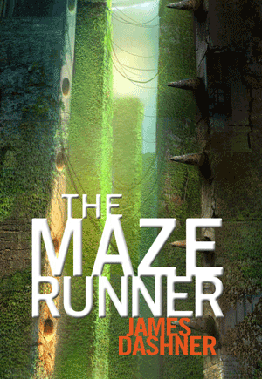 The Book (by James Dashner): When Thomas wakes up in the lift, the only thing he can remember is his first name. His memory is blank. But he’s not alone. When the lift’s doors open, Thomas finds himself surrounded by kids who welcome him to the Glade—a large, open expanse surrounded by stone walls. Just like Thomas, the Gladers don’t know why or how they got to the Glade. All they know is that every morning the stone doors to the maze that surrounds them have opened. Every night they’ve closed tight. And every 30 days a new boy has been delivered in the lift. Thomas was expected. But the next day, a girl is sent up—the first girl to ever arrive in the Glade. And more surprising yet is the message she delivers. Thomas might be more important than he could ever guess. If only he could unlock the dark secrets buried within his mind. --Amazon Product Description
The Book (by James Dashner): When Thomas wakes up in the lift, the only thing he can remember is his first name. His memory is blank. But he’s not alone. When the lift’s doors open, Thomas finds himself surrounded by kids who welcome him to the Glade—a large, open expanse surrounded by stone walls. Just like Thomas, the Gladers don’t know why or how they got to the Glade. All they know is that every morning the stone doors to the maze that surrounds them have opened. Every night they’ve closed tight. And every 30 days a new boy has been delivered in the lift. Thomas was expected. But the next day, a girl is sent up—the first girl to ever arrive in the Glade. And more surprising yet is the message she delivers. Thomas might be more important than he could ever guess. If only he could unlock the dark secrets buried within his mind. --Amazon Product DescriptionThe Game (from Rio Grande): This game is less of a game and more of a puzzle, which explains why there's such an odd number of players possible. There's a four-piece modular board that forms a large room with walls spread around the board. There are also color-coded targets on boards. Placed on top of the surface are four robots. The idea for each turn/puzzle is to get the like-colored robot to randomly selected target. The trick is that once a robot starts moving, it will continue to move until a wall or another robot stops it. Therefore, players are seeking a sequence of moves for the robots which will enable them to move the required robot to the target in the fewest moves. --Amazon Product description
Both of these are all about the puzzle. In The Maze Runner, we watch Thomas struggle with what's really going on, digesting clues, trying to shove a square peg in a round hole to make sense of the deadly world he's trapped in. Ricochet Robots leaves me with a similar feeling of terror (in a good way). My brain sweats, my eyes narrow, and I find route after route to the target that just doesn't quite work -- until there's that satisfactory light bulb moment.
The Maze Runner is the kind of book I could sit and read in an evening, or if I'm swamped, one tense chapter at a time. James Dashner does an excellent job of laying clues and making them memorable without making them obvious. One of my favorite features of Ricochet Robots is likewise how flexible it is to fit my gaming needs. You can play it with as many people as you can fit around a table, making it perfect for large gatherings. Since the puzzles happen in rounds and there's a nice catch-up mechanism, it's also not a game-loss situation to cut out to change a diaper or stop a toddler from fixing his own eggs. It's also easy to just play a few puzzles, if time is scarce, or to keep going if it's not.
In short, if you want to work your brain, whether you have hours or just a few minutes to sneak in a chapter or a puzzle, The Maze Runner or Ricochet Robots is an excellent choice.

